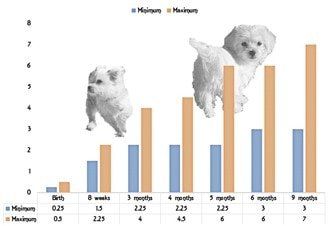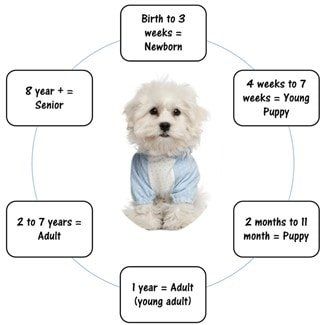Did you know that Maltese puppies have a surprisingly long growth period? While most small dog breeds reach their full size within a year, Maltese puppies continue to grow for up to 18 months. This extended growth period allows them to develop their signature silky white coat and elegant appearance.
The growth of a Maltese puppy is influenced by various factors, including genetics, diet, and overall health. On average, a Maltese puppy will reach its maximum height around 6-9 months, but it may continue to fill out and gain muscle until it is 12-18 months old. It’s crucial to provide them with a balanced diet and regular exercise to support their growth and development. Ensuring they receive proper nutrition and care during this crucial period will result in a healthy and well-proportioned adult Maltese. So, be patient, and enjoy watching your adorable little Maltese pup grow into its full potential.
A Maltese puppy generally stops growing between 9 to 12 months of age. During this time, they go through various growth stages, starting as tiny balls of fur and reaching their adult size. It’s important to provide them with a balanced diet, plenty of exercise, and regular vet check-ups to ensure proper growth and development. Additionally, socialization and training play a vital role in shaping their behavior as they mature into adult dogs.

When Does a Maltese Puppy Stop Growing?
Maltese puppies are known for their small and adorable size, which often makes pet owners wonder when exactly they will stop growing. It’s natural to be curious about this, as understanding your dog’s growth timeline can help you provide the best care and anticipate any changes in their needs. In this article, we will delve into the growth stages of a Maltese puppy and explore when they typically reach their full size.
Stage 1: The Newborn Phase
When a Maltese puppy is born, they are incredibly tiny and fragile, weighing just a few ounces. During this stage, the puppy relies on their mother for nourishment and protection. They are completely dependent on her milk for nutrition and are unable to regulate their body temperature, requiring a warm and safe environment.
Throughout this phase, the Maltese puppy grows rapidly, doubling their weight within the first two weeks. Their eyes and ears slowly open, and they develop the ability to crawl and eventually walk. It’s an exciting time as you witness the puppy’s growth and their first experiences in the world.
By the end of the newborn phase, which lasts approximately 2-3 weeks, the Maltese puppy will have gained more strength and will start exploring their surroundings more confidently. At this point, they will start transitioning to solid food and become less reliant on their mother’s milk.
Stage 2: The Puppyhood Phase
After the newborn phase, a Maltese puppy enters the puppyhood phase. This phase is characterized by rapid growth and development. During this time, the Maltese puppy will experience significant physical changes, such as an increase in size, weight, and the development of their teeth.
Between the ages of 3 to 6 months, a Maltese puppy will go through a growth spurt. This is the period where they will experience the most noticeable changes in size. It’s important to provide them with a balanced diet to support their growth and ensure they receive the necessary nutrients.
By 6 months, most Maltese puppies will have reached a significant portion of their adult size. However, it’s essential to note that the growth process is not yet complete. While they may look like miniature versions of adult Maltese dogs, they still have some maturing to do.
Stage 3: The Adult Phase
At around the 1-year mark, a Maltese puppy will typically reach their full adult size. By this time, they will have developed into a small breed dog with a weight ranging between 4 to 7 pounds and a height of approximately 8-10 inches at the shoulder.
While their growth in terms of size may have slowed down, it’s important to understand that the development process continues. Mentally and emotionally, adult Maltese dogs will continue to mature and reach their full potential. They will start exhibiting the full range of their adult personality and characteristics.
It’s essential to remember that each Maltese puppy is unique, and there can be variations in growth rates among individuals. Factors such as genetics, diet, and overall health can influence their growth milestones. Regular visits to the veterinarian can help monitor their growth and ensure they are healthy throughout their development.
Factors That Can Affect a Maltese Puppy’s Growth
Now that we’ve explored the typical growth stages of a Maltese puppy, it’s important to understand the factors that can influence their growth timeline. Here are a few key factors that can affect when a Maltese puppy stops growing:
1. Genetics:
Genetics play a significant role in determining the size and growth rate of a Maltese puppy. If the parents of the puppy are smaller in size, it’s likely that the puppy will also be smaller when fully grown. On the other hand, if the parents are larger, the puppy may reach a slightly larger size at adulthood.
2. Nutrition and Diet:
A nutritious and balanced diet is vital for a Maltese puppy’s growth and development. Providing them with high-quality puppy food that is appropriate for their age and size can contribute to healthy growth. It’s important to follow the feeding guidelines provided by the food manufacturer and consult with a veterinarian for personalized recommendations.
3. Exercise and Physical Activity:
Regular exercise and physical activity are essential for a Maltese puppy’s overall health and growth. Engaging in activities that stimulate them mentally and physically, such as walks, playtime, and training sessions, can help promote proper bone development and muscle growth.
4. Health and Well-being:
A Maltese puppy’s overall health and well-being can impact their growth and development. Regular veterinary check-ups, vaccinations, and preventive care can ensure any potential health issues are addressed promptly, allowing the puppy to grow and develop without hindrances.
5. Spaying or Neutering:
Spaying or neutering a Maltese puppy can affect their growth timeline. Typically, it’s recommended to wait until the puppy has reached their full adult size before considering the procedure. Consult with a veterinarian for guidance on the appropriate timing for spaying or neutering.
When Does a Maltese Puppy Reach their Full Size?
By the age of 1 year, most Maltese puppies will have reached their full size. However, it’s important to note that growth and development continue beyond this point. Mentally and emotionally, they will continue to mature into adult dogs, further developing their personality traits.
While it’s exciting to anticipate the growth journey of your Maltese puppy, it’s important to remember that each dog is unique, and growth rates can vary. Proper nutrition, exercise, and regular veterinary care are essential to ensure they thrive and reach their full potential.
Providing a loving and nurturing environment for your Maltese puppy, along with a healthy lifestyle, will contribute to their overall well-being and happiness. Enjoy every stage of their growth and cherish the precious moments with your furry companion.
Key Takeaways: When Does a Maltese Puppy Stop Growing?
1. Maltese puppies typically stop growing when they reach their full adult size, which is usually around 12 months of age.
2. The growth rate of a Maltese puppy varies, with the majority of growth occurring in the first six months.
3. Proper nutrition and a balanced diet are crucial for a Maltese puppy’s healthy growth and development.
4. Regular exercise and playtime are essential to ensure proper muscle development in a Maltese puppy.
5. It’s important to monitor a Maltese puppy’s weight and consult a veterinarian for guidance on their growth rate.
Frequently Asked Questions
How long does it take for a Maltese puppy to stop growing?
A Maltese puppy typically stops growing between 8-12 months of age. However, it’s important to note that every puppy is unique, and growth rates might vary.
During these first months, their skeletal structure and body composition develop rapidly. You can expect your Maltese puppy to reach their adult height and weight within this timeframe.
What are the signs that a Maltese puppy has stopped growing?
One indicator that a Maltese puppy has stopped growing is when their growth rate significantly slows down or ceases altogether. You may notice that their body proportions start to resemble those of an adult Maltese, with a fully formed face and a fully developed body.
Additionally, their weight may stabilize, and their height may remain relatively constant. These signs suggest that your Maltese puppy has reached their full physical maturity.
What factors can influence the growth rate of a Maltese puppy?
The growth rate of a Maltese puppy can be influenced by various factors such as genetics, nutrition, exercise, and overall health. Genes inherited from the parents play a significant role in determining the puppy’s growth potential.
A well-balanced diet, rich in essential nutrients and appropriate for their age, is crucial for proper growth. Regular exercise is also important to help promote healthy development. Lastly, any underlying health issues can potentially affect the growth rate of a Maltese puppy.
What should I feed my Maltese puppy to support healthy growth?
To support healthy growth in your Maltese puppy, provide them with a high-quality puppy food that is specifically formulated for small breeds. Look for a balanced diet that contains essential nutrients such as protein, fats, vitamins, and minerals.
Consult with your veterinarian to determine the best feeding schedule and portion sizes for your puppy, as their nutritional needs may vary based on their age, weight, and activity level. It’s important to establish healthy eating habits from a young age to support proper growth and development.
How can I ensure that my Maltese puppy grows up to be healthy and strong?
To ensure that your Maltese puppy grows up to be healthy and strong, provide them with regular veterinary check-ups, a balanced diet, and plenty of exercise and mental stimulation. Regular vet visits will help monitor their growth, address any health concerns, and keep their vaccinations up to date.
In addition to their diet, ensure that your puppy receives enough physical activity and mental enrichment to support their overall development. Regular grooming, dental care, and socialization are also important aspects of raising a healthy and happy Maltese puppy.

Summary
So, when does a Maltese puppy stop growing? Well, Maltese puppies typically stop growing around 8 to 12 months of age. However, it’s important to note that every puppy is unique and may reach their full size at different times.
Remember, during this growth period, it’s crucial to provide them with a balanced diet rich in nutrients to support their development. Additionally, regular vet check-ups and plenty of exercise are essential for their overall health and well-being. Taking good care of your Maltese puppy as they grow will ensure they become a happy and healthy adult dog.
